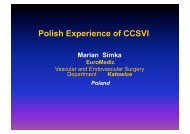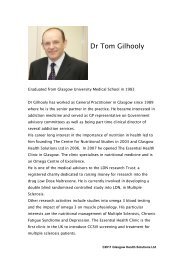ISNVD Abstract Book
ISNVD Abstract Book
ISNVD Abstract Book
You also want an ePaper? Increase the reach of your titles
YUMPU automatically turns print PDFs into web optimized ePapers that Google loves.
SUNDAY – FEBRUARY 19, 2012 11:30am-11:45am<br />
Advancing a CCSVI Research Agenda Focused on Care (Kirsty Duncan, CANADA)<br />
Since Zamboni’s initial description of chronic cerebrospinal venous insufficiency (CCSVI), patients, practitioners,<br />
scientists, and decision-makers have been left with numerous questions regarding the condition, the<br />
procedure, and its impacts on the quality of life for patients diagnosed with multiple sclerosis (MS). In general,<br />
questions have focused on the venous system and CCSVI and how these relate to MS, CCSVI diagnosis and<br />
treatment, the benefits and adverse effects of CCSVI treatment, re-stenosis and its diagnosis, and secondary<br />
procedures. Several questions have received much less attention: namely, combined therapies, follow-up care,<br />
supportive care for recovering patients, and prevention in the next generation. In terms of combination<br />
therapies, questions should include: "Is CCSVI treatment along with pharmacological agents more efficacious<br />
than just the CCSVI procedure? and "Is CCSVI treatment more efficacious with mesenchymal- or adiposederived<br />
stem-cell infusion than just the CCSVI procedure alone?" Follow-up care has centered primarily on<br />
when re-imaging should be done. However, important questions are: what is the optimal environment for<br />
recovery, and what are the best supportive care therapies following the procedure, including, brain plasticity<br />
exercises, drugs, nutrition, osteopathy, physiotherapy, speech therapy, supplements, etc., and which therapies<br />
have the best outcomes? After treatment, many MS patients want to know how CCSVI can be prevented in the<br />
next generation. What would be the best method to discover and treat vascular problems at the earliest time<br />
possible to avoid possible health impacts at a later date? Will giving children and adolescents vitamin D reduce<br />
the risk of their developing vein inflammation and venous hypertesion? This paper will first present a<br />
comprehensive set of questions related to the above issues and recommend a consultative process to develop<br />
a research agenda focused on patient care.<br />
No financial disclosures to report.




